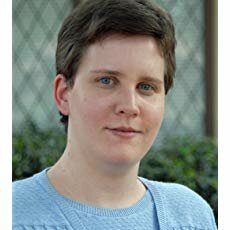According to Kevin Trainor’s bio, he’s an Army Security Agency veteran. He is a Russian/German/Spanish linguist and did signal intelligence and electronic warfare. He served four years active duty and another twelve years in the National Guard and Reserve. This is what led to his memoir What Did You Do in the Cold War, Dad? He’s also an avid anime and science fiction fan as well as a published sci-fi author.
Tamara Wilhite: You have such an interest in Anime that you’re the nominal head of the Anime & Recruiting bureau of the National Fantasy Fan Federation, also called N3F. What does that entail?
Kevin Trainor: Mostly I’m looking to get other anime fans interested in the N3F as a place to publish and read reviews of anime and manga, maybe publish some art. We’re reaching out to alternative social media, which has caused a bit of a kerfluffle, but so far we haven’t had too many flounces over it. These days, I’m mostly talking to people one on one about N3F and maintaining the membership roster; there’s two other fellows in the recruiting bureau, and they’re posting ads in online SF zines and groups.
Tamara Wilhite: In a prior conversation, you mentioned classic sci-fi writers who influenced you like Poul Anderson, David Drake, Robert Heinlein, Keith Laumer, and Samuel Eliot Morison. What do you like to read?
Kevin Trainor: Most recently I’ve been reading Peter Nealen’s MAELSTROM RISING technothrillers, which are SF by some peoples’ definitions and not others. I’ve also been rereading the Revelations Cycle novels, which kick off the Four Horsemen universe; David Drake’s ROLLING HOT, one of his Hammer’s Slammers novels; and it’s about time for me to go through Drake & Stirling’s Raj Whitehall series, which is a perennial favorite.
Tamara Wilhite: You have a great understanding of military history as well as somewhat recent military experience. How do you think warfare is evolving beyond jokes of watching Twitter posts about bombs instead of watching CNN to learn where the rockets hit?
Kevin Trainor: Some days I think we’re headed towards the kind of awesome high-tech powered-armor future we saw in STARSHIP TROOPERS and the Four Horsemen series, and other days I think it’s going to be more like Gordy Dickson’s Dorsai stories, where complex high-tech gear is too difficult to maintain in the field and too easy to defeat with countermeasures, so everybody uses simple rifles. Jerry Pournelle’s CoDominium universe was like that as well – most of the colony planets and a good number of the independent planets just didn’t have the technology and manufacturing base to support the kind of weaponry that was common in the Cold War – heavy armor & artillery, electronic warfare, combat aircraft, all that stuff.
Tamara Wilhite: What is your take on the slowly evolving social credit systems in the West? Where your ability to maintain a bank account or access Big Tech services is based on your de facto digital reputation?
Kevin Trainor: Well, I’m agin’ it. The Chicoms are a lot better at that stuff than we are, and I think if we get forced down that road by Big Tech and their allies in the Democratic Party, we’re going to wind up in a worse variant of what James Blish had in his Okies novels, the Bureaucratic State with Beijing calling the shots instead of Moscow. I think before that happens, though, you’re going to get a hot civil war, or you’re going to get parallel systems of banking and social media that won’t tolerate that kind of behavior, which may or may not lead to shooting.
Tamara Wilhite: You said you’ve spent a dozen years trying to write the Great Anime-based Space Opera Novel. That led to your short story collection, The Anti-Dog Tank and Other Stories. Have you ever finished and published the novel you had planned?
Kevin Trainor: This is embarrassing to admit, but what’s holding me up on Starfighter Girls (the aforementioned space opera) is that I haven’t been able to get off the dime and write the battle scenes. There’s about four major battles in the novel before the final one, and I keep dithering over whether I should game them out or follow S.M. Stirling’s example and just write the damn things. (I was genuinely shocked to find out that he hadn’t played out the battles in the Raj Whitehall and Emberverse novels with miniatures, because they sure read that way.) I’m actually further along with The Misfit, which is a retooling of an old Malcolm Jameson story about a young man who desperately wants to follow his war hero father into battle during an interstellar war, but his widowed mother has too much financial clout for the powers that be to allow that. The short story collection really doesn’t have anything to do with either of them; two of them are set in a Second Civil War after an abortive nuclear exchange with the Red Chinese, and the rest of them are just weird little things that came to me. I don’t follow Poul Anderson’s practice of leaving a bowl of milk out for the brownies in exchange for story ideas, but every so often, my muse will drop a scene on me, and it’s off to the races.
Tamara Wilhite: What else are you working on?
Kevin Trainor: Well, taxes, obviously; it’s that time of year. I have a magical girl story that I was hoping to shop to Jason Cordova’s upcoming TANKS FOR THE MAMMARIES anthology, but I was too slow and a couple million other authors got their stories in first. I have a couple of sequels in mind for “They Are Telling Me It Is Time To Go”, and something inspired by Peter Nealen’s MAELSTROM RISING series which asks the question – if the Triarii are all ex-SpecOps and Marines, what happens to the older, fatter troops who might still have some gas in the tank and don’t want to go down without a fight?
Tamara Wilhite: Is there anything you’d like to add?
Kevin Trainor: I’d like to encourage your readers to join the N3F, if they haven’t already. Aside from Dragon*Con and a few other places, we’re one of the few genuinely apolitical organizations left in fandom, and we’re always interested in peoples’ opinions about anime, SF, fantasy, movies, TV, and games. We have six zines and an Amateur Press Association, so there’s a lot of room for people to speak their minds.
Tamara Wilhite: Thank you for speaking with me.
Thank you for asking!



Comments